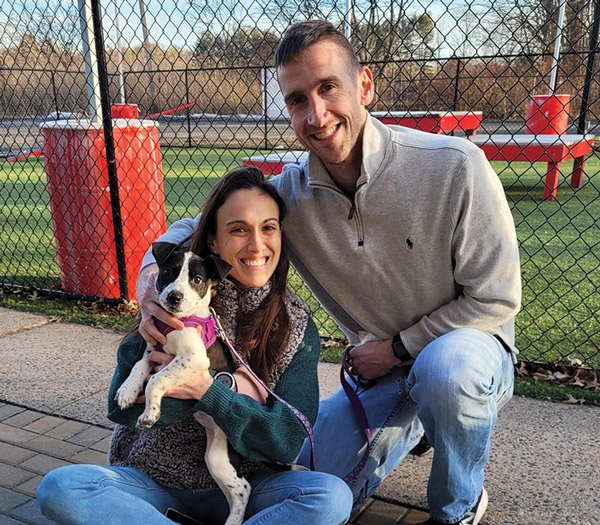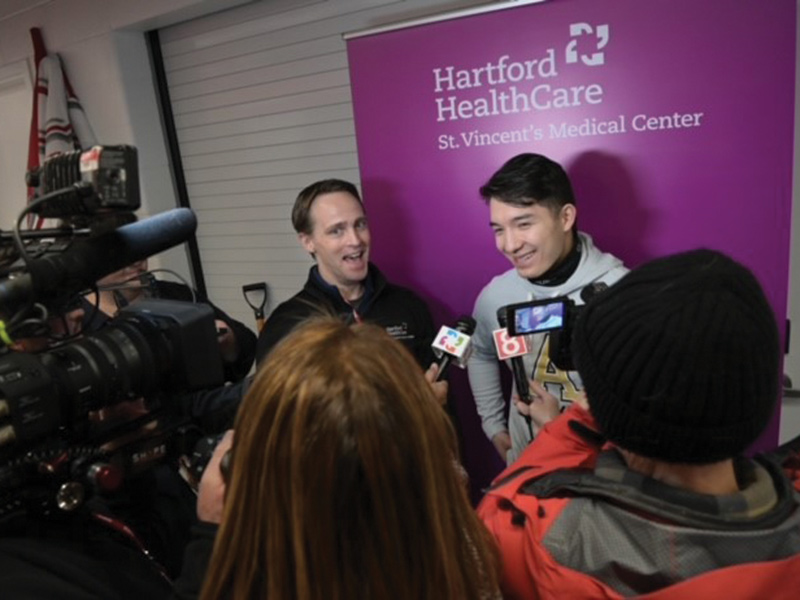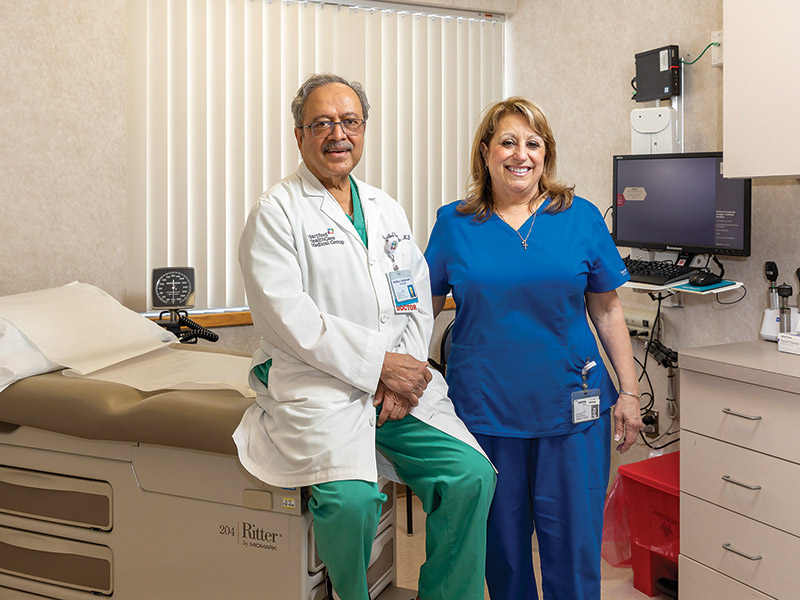Health Catastrophes Helps Dietitian Live in the Moment
By Elissa Bass
Before he even turned 35, Christopher Barrett suffered a major cardiac event, a stroke, and was then diagnosed with cancer.
A successful marathoner and a top performer at both the New York and Boston marathons, Barrett had to quit running after ventricular arrhythmia meant he needed an implantable cardioverter defibrillator (ICD)/pacemaker.

A registered dietitian and nutritionist with the Bone & Joint Institute Center for Musculoskeletal Health, he says the three catastrophic health events since 2017 also changed his mental outlook on life.
“I look at life with a different perspective now,” he explains. “Before, it was all about competing. It has refocused me on the things that really do matter in life. It’s like Hartford HealthCare’s slogan, ‘Every Moment Matters.’ Every moment does matter.”
It started in 2017, when Barrett, then 29, was training for a marathon. Out for a run, he collapsed in someone’s front yard. Taken by ambulance to a hospital, it was determined he had suffered ventricular arrhythmia. Five days, later doctors implanted the ICD, ending his long-distance running career.
“I look at life with a different perspective now…It has refocused me on the things that really do matter in life.”
Three years later, he and his new wife, Taryn, had just closed on their first home in Berlin. After dinner, Barrett got up to put his dishes in the sink, and couldn’t move his right leg or arm. His wife asked if he was okay, and he couldn’t speak. Again at the hospital, doctors diagnosed a stroke. Surgeons cleared the blockage that caused the incident, and it took him days to regain speech and movement. Current treatment is provided by HHC cardiologist Antonio Fernandez, MD.
In 2021, a self-exam led to a diagnosis of testicular cancer. HHC urologist Anoop Meraney, MD, immediately scheduled him for surgery. Because it was diagnosed early, he didn’t need follow-up treatments but continues to have periodic scans and x-rays.
Through Dr. Fernandez, Barrett began seeing a Behavioral Health Network therapist David Finitsis, PsyD, to help process all that has happened and manage his anxiety. “I felt like I was always waiting for the other shoe to drop,” he says. “Life is short and it has continued to humble me, yet I wake up daily grateful for another opportunity to make those who I love proud.”
Hockey Player Wins Face-off With Death
By Robin Stanley
Eric Huss will be telling the story about the scar on his face for years to come.
In a hockey game between the U.S. Military Academy at West Point, where the 23-year-old plays forward, and Sacred Heart University, Huss recalls feeling the impact of a freak accident with an opposing player’s skate blade. Slicing his facial artery, it was a life-threatening situation.
“His foot came up and, honestly, it felt like I had been hit in the face with a punch,” Huss says. “I didn’t register that I had been cut. I looked down and saw this trail of blood.”

West Point’s senior associate athletic trainer Rachel Leahy jumped into action to stop the bleed. She applied pressure to the wound with both hands and didn’t let go until the gurney was wheeled into the St. Vincent’s Medical Center Emergency Department.
“There wasn’t space in the ambulance for me to stand next to Eric. I got on top of him so I could apply pressure and fit,” says Leahy, a Quinnipiac University graduate.
The trauma team, led by surgeon Matthew Carlson, MD, took over.
“Eric came through as a level 1 trauma activation, the highest level,” Dr. Carlson says. “Since Sacred Heart is so close to St. Vincent’s, we didn’t have much advance notice. Eric was injured very badly. He was very pale, but calm and alert.”
After quickly assessing the injury, the team decided Huss needed surgery. Preparations were made for a blood transfusion and the anesthesiologist worked to get Huss sedated as quickly as possible.
“His facial artery on the right side was severed and bleeding rapidly,” Dr. Carlson explains. “There was some injury to the muscle in the neck but the primary life-threatening injury he had was to the facial artery.”
The team clamped and ligated the facial artery, and Huss was released from St. Vincent’s just 24 hours later.
“Eric came through as a level 1 trauma activation, the highest level. Since Sacred Heart is so close to St. Vincent’s, we didn’t have much advance notice.”
“Everything just worked perfectly,” Dr. Carlson says, attributing Leahy’s quick actions with saving Huss’s life.
One month later, West Point was back to play Sacred Heart. Huss laced up and reunited with the medical professionals who saved his life.
“How do you thank someone for saving your life?” he says. “I’m going to get there. I’ll figure out a way.”
Clinical Duo Celebrates Four+ Decades of Caring
By Maggie Werner
They’ve only been with Hartford HealthCare for three years, but Muzibul Chowdhury, MD, and Marina Flodine have practiced medicine together for more than four decades, caring for three generations of patients.
It was 1975 when Dr. Chowdhury began practicing cardiology and internal medicine in a small Windsor practice. When he needed a medical assistant, Flodine applied.
“I heard about the job and thought, ‘I guess I’ll try this out,’” she says. “All of a sudden, one year became five, five became 10, 10 became 20 and here I am at 44 years. I decided I’m staying in this until the end.”
After about 40 years in private practice, Dr. Chowdhury decided to transition to Hartford HealthCare Medical Group and, of course, Flodine joined him.

“I’m almost 77 years old,” Dr. Chowdhury says. “I wanted to know if something happens to me, my patients will be taken care of. That’s why I came to Hartford HealthCare.”
Both enjoy what they do and value the relationships formed with patients over the years. “We love our patients and they love us,” Flodine exclaims. “We have this wonderful relationship with them that we don’t even have to discuss. It just exists.”
“I hear a lot of doctors say they’re burnt out, and I don’t have the sense of burnout. I like what I do and I look forward to seeing my patients,” Dr. Chowdhury adds. “I don’t need to work, but I do it because Marina has been here. Over the years, she’s picked up a lot of things that I do. She knows my preferences and the way I do things, so it’s easy.”
“We work well together,” Flodine replies. “I know what he likes and he knows what I like. We sort of finish each other’s sentences.”
The dynamic duo has watched many of their patients grow old over the years and live full lives.
“Our patients follow the instructions we give them and they live late years,” Flodine says. “We have so many 90-year-old patients. We were just invited to a patient’s 100th birthday, and that wasn’t the first one!” “We grow with our patients,” Dr. Chowdhury says. “They become like our families.”
Even after 44 years working together, he and Flodine still embody the passion of medicine and are in it for their patients.
